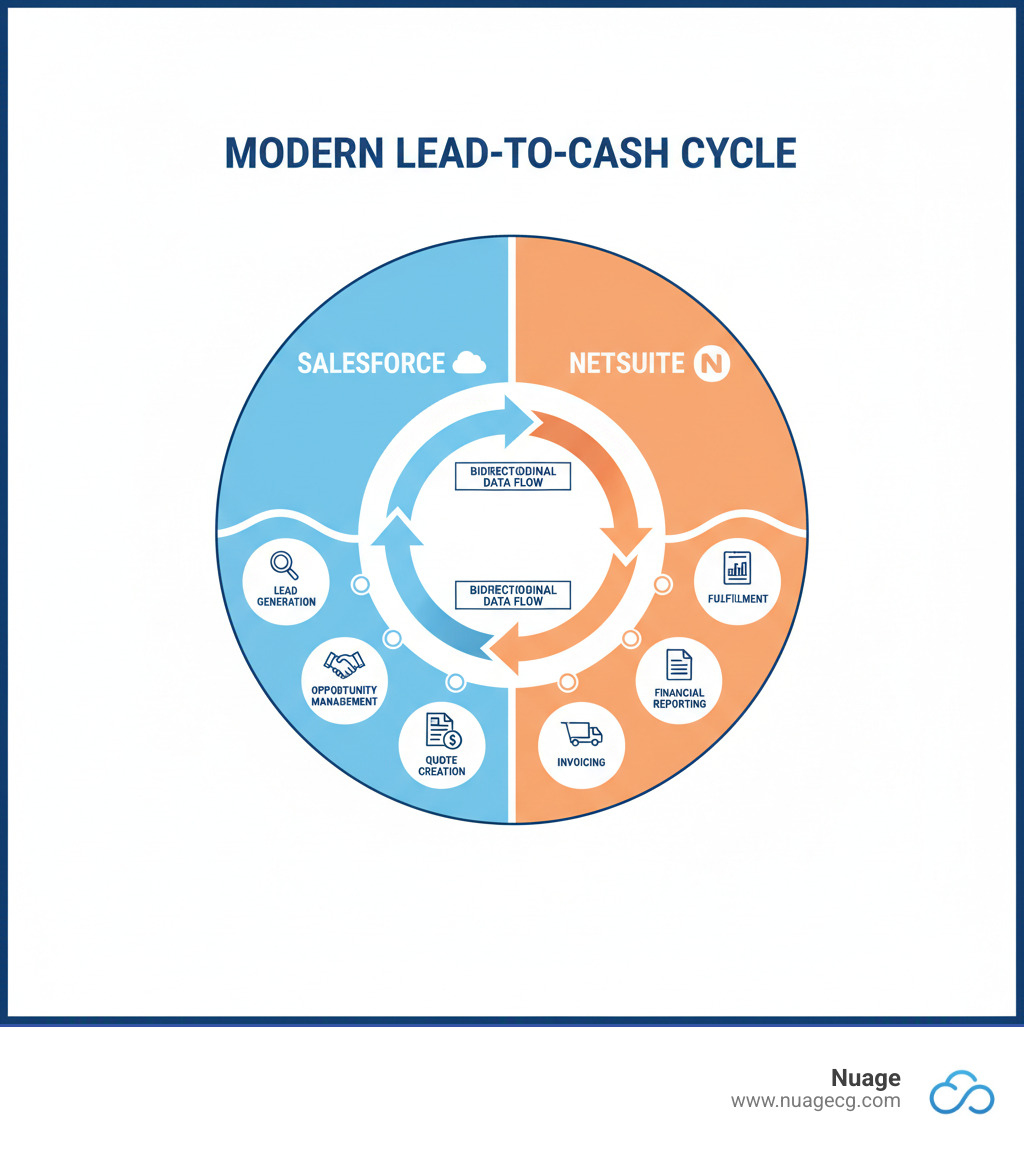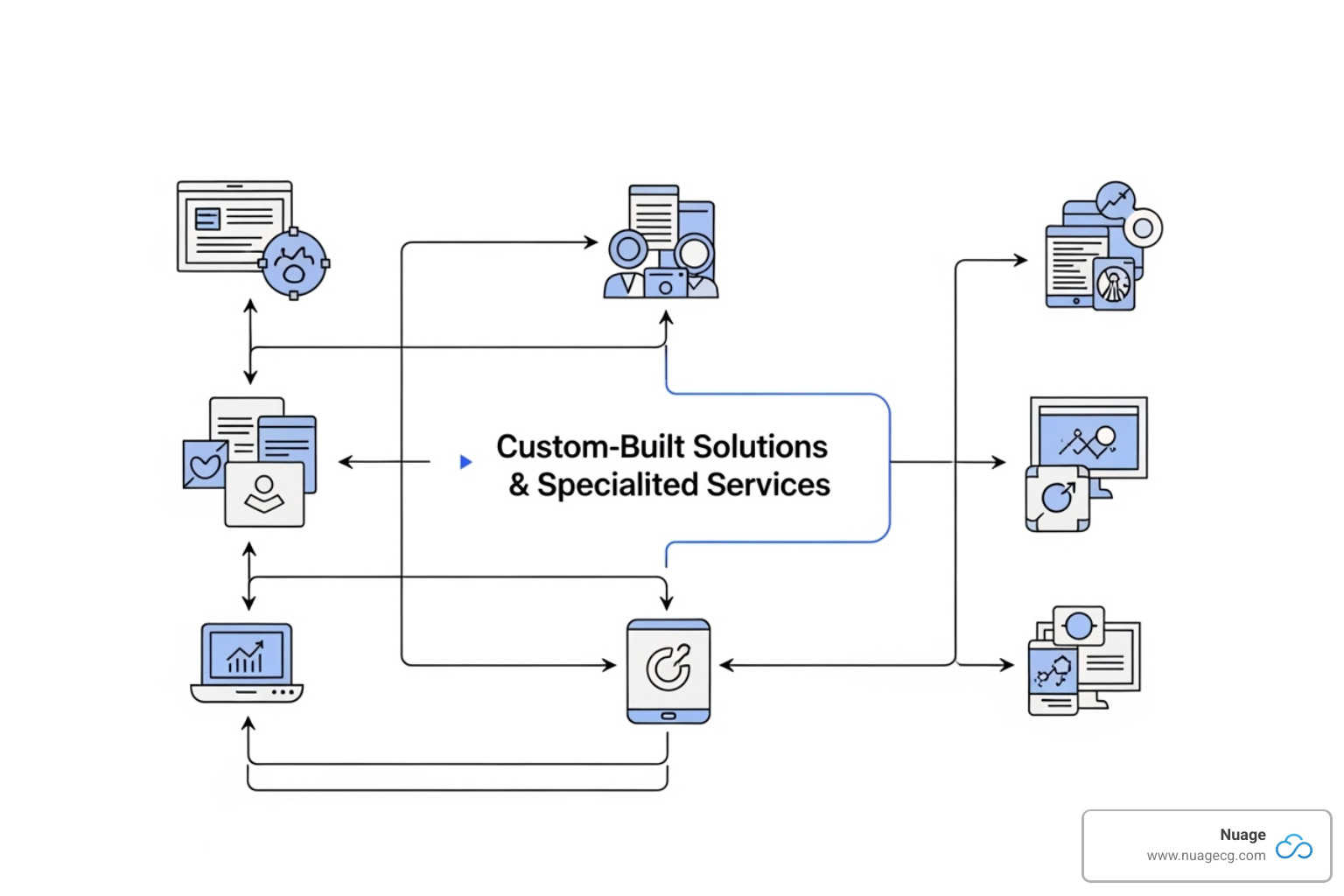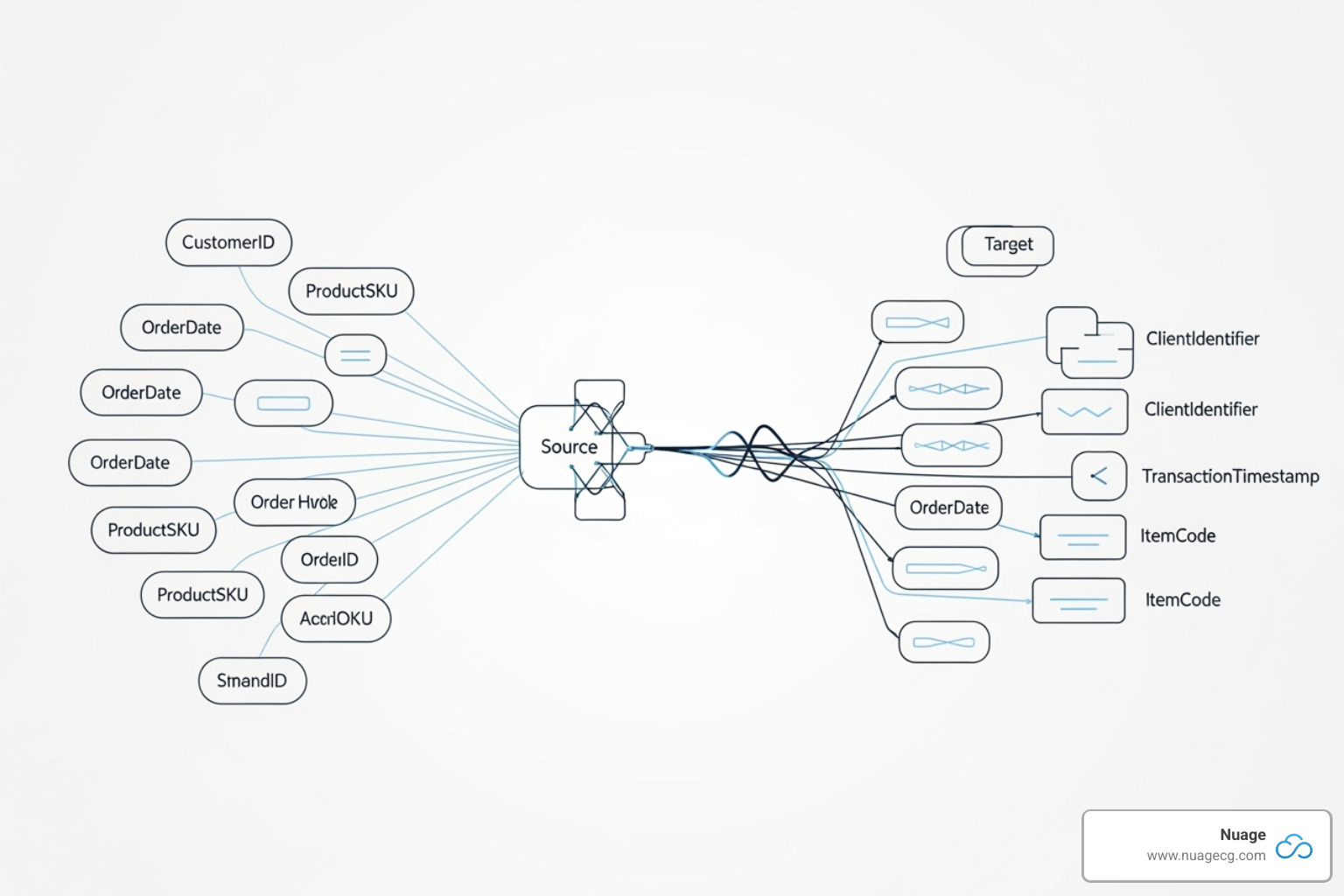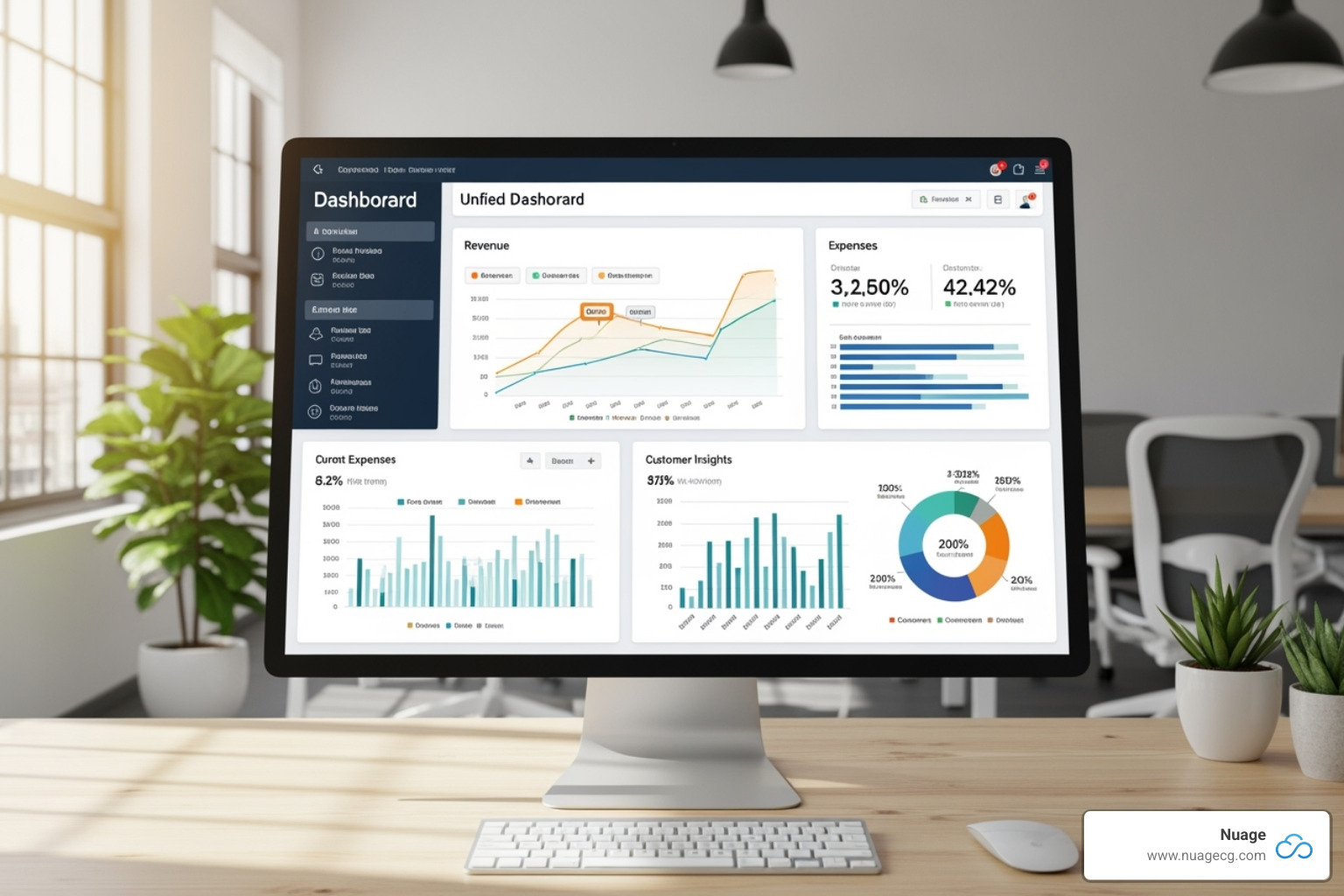Why Salesforce and NetSuite Account Integration is Critical for Modern Business

Salesforce and NetSuite account integration connects your CRM and ERP, eliminating data silos and creating a seamless flow of information. This unified approach syncs critical data—including accounts, contacts, and opportunities—while automating the lead-to-cash process. It provides sales teams with real-time financial visibility, such as payment status and credit information, directly within Salesforce.
Without integration, sales teams lack inventory visibility, and finance teams struggle with outdated customer data. Manual data entry between NetSuite and Salesforce leads to errors, delays, and a poor customer experience. Integration solves these issues by creating a single source of truth, giving sales real-time visibility into orders and credit, while finance receives automated updates for faster processing.
I’m Louis Balla, CRO and partner at Nuage. With over 15 years of experience in digital change and integration, I specialize in salesforce and netsuite account integration projects that streamline business processes and drive growth.

Salesforce and netsuite account integration further reading:
Why Integrate Salesforce and NetSuite? The Core Benefits for Account Management
With a proper salesforce and netsuite account integration, your sales rep can see a client’s inventory levels and payment status directly in Salesforce, while your finance team receives customer updates automatically. This seamless data flow is key to efficient account management.
Integration creates a single source of truth for customer data, eliminating departmental silos. This provides a 360-degree customer view, allowing sales to see payment history and order status in Salesforce, while finance gets immediate updates on closed deals. Everyone works from the same complete, accurate playbook.
By automating data synchronization between Salesforce and NetSuite, you dramatically improve data accuracy. Manual entry errors, duplicate records, and forgotten updates are eliminated as information flows between systems in real-time.
This empowers your teams to make better decisions. Sales reps can confidently commit to orders with real-time inventory and credit data, while finance can process orders faster. Teams spend less time hunting for information and more time on value-added activities.
Streamline the Lead-to-Cash Cycle
Integration transforms the lead-to-cash cycle from a manual, error-prone process into an automated, efficient workflow.
The opportunity-to-order process is a prime example. When a deal is closed in Salesforce, a sales order is automatically created in NetSuite. This eliminates manual recreation of the order, speeding up confirmation and fulfillment.
Automated workflows manage the entire quote-to-cash process. Accepted quotes can trigger invoices, and shipping updates are reflected in both systems. This leads to faster billing cycles and improved cash flow as payments are collected sooner.
This automation drives increased efficiency. By reducing manual work and errors, your teams can focus on strategic activities that grow the business, such as building customer relationships and closing new deals.
Improve Data Accuracy and Visibility
A key benefit of salesforce and netsuite account integration is the dramatic improvement in data accuracy and visibility by removing manual processes. Key improvements include:
- Elimination of Manual Entry: Automating data flow between Salesforce and NetSuite removes the primary source of errors and ensures data consistency.
- Consistent Customer Data: All departments work with the same synchronized contact information, addresses, and preferences.
- Real-Time Inventory Visibility: Sales teams can see current stock levels directly in Salesforce, preventing them from selling out-of-stock products.
- Financial Status Visibility: Sales reps gain access to customer payment history, credit status, and outstanding invoices without leaving their CRM.
Choosing Your Integration Method: Approaches and Options
When planning your salesforce and netsuite account integration, you must choose an approach that fits your business needs, technical resources, and budget. The main options are pre-built connectors and custom integrations.

Pre-built connectors and iPaaS solutions offer faster deployment and lower upfront costs with pre-configured workflows for common scenarios. However, they may lack the flexibility for unique business processes. Custom integrations provide maximum flexibility and control but require a larger investment in time, budget, and technical expertise, plus ongoing maintenance.
Your choice also impacts technical requirements, budget structure (subscription vs. upfront), and scalability. A scalable solution is crucial to ensure your integration can grow with your business.
Using Nuage’s Integration Services
Navigating these options can be complex. Nuage’s integration services simplify your salesforce and netsuite account integration by applying our expertise to select the right tools for your specific needs.
We blend approaches, using pre-built and custom connectors strategically. By leveraging low-code and custom platforms, we prioritize configuration over coding to accelerate deployment while maintaining flexibility. This ensures the solution is custom to your actual business operations.
All our solutions are built for scalability, adapting to increased data volumes and workflow complexity as you grow. We offer both subscription and project-based options to fit your financial framework. Learn more about our Salesforce integration strategies to see how we connect critical business systems.
Custom Integration Solutions with Nuage
For businesses with highly complex or unique requirements, a standard solution may not suffice. This is where Nuage’s custom integration solutions provide the necessary flexibility.
Our custom salesforce and netsuite account integration solutions offer maximum flexibility, allowing us to design workflows that match your exact processes. This requires deep development expertise in both Salesforce APIs and the NetSuite REST API. We also provide the crucial ongoing support and maintenance that custom solutions require to function smoothly over time.
Our solutions are designed and implemented by our certified team, who take the time to understand your unique requirements. We act as long-term partners, ensuring your custom integration delivers strategic value and supports your long-term goals.
A Step-by-Step Guide to a Successful Salesforce and NetSuite Account Integration
A successful salesforce and netsuite account integration requires careful planning and a proven methodology. At Nuage, our 20+ years of experience have refined a structured, three-phase approach that removes guesswork and ensures a clear roadmap from start to finish.
Phase 1: Discovery and Planning
This foundational phase is about discovery and strategy. We work with your team to define the project’s scope and goals. Key activities include:
- Defining Objectives: We clarify your goals, whether it’s accelerating the quote-to-cash cycle, eliminating data errors, or improving visibility.
- Identifying Stakeholders: We bring together representatives from sales, finance, IT, and other affected teams to ensure all requirements are captured.
- System and Data Audit: We conduct a comprehensive audit of your Salesforce and NetSuite environments, assessing customizations, data structures, and overall data quality. Our NetSuite Assessment is a key tool here.
- Mapping and KPIs: We create a detailed data mapping strategy to define how information will flow and transform between systems. We also establish clear KPIs to measure the integration’s success.
Phase 2: Configuration and Development
In this phase, our technical team builds the connections and workflows defined during planning. The process involves:
- Secure Connections: We establish secure, token-based connections between Salesforce and NetSuite to protect your data.
- Field Configuration and Mapping: We configure any necessary custom fields and map data fields according to the strategy, implementing data cleansing rules to maintain quality.
- Workflow Development: We build and test the automated workflows, such as creating a NetSuite sales order from a closed Salesforce opportunity. Each workflow is rigorously tested in a development environment to handle various scenarios.

Phase 3: Testing, Deployment, and Training
The final phase ensures the integration is ready for production and that your team is prepared for the new processes. Steps include:
- User Acceptance Testing (UAT): Key stakeholders test the integration in a staging environment using real-world scenarios to identify any issues before launch.
- Deployment: We execute a carefully planned go-live strategy, typically during off-peak hours, to transition to the new integrated system with minimal disruption.
- End-User Training: We provide comprehensive training sessions custom to each team, ensuring they understand the new workflows and benefits.
- Change Management: We offer ongoing support and clear communication to help your teams adapt, ensuring the integration empowers them to work more effectively.
Overcoming Common Integration Challenges
Even a well-planned salesforce and netsuite account integration can present challenges. With over two decades of experience, we have proven strategies to overcome common obstacles related to data quality, technical limitations, and security.
Managing Data Duplication and Quality
Inconsistent data between systems is a common problem. To prevent this, we focus on managing data duplication and quality from the start. Our strategies include:
- Master Data Management: We define which system is the “source of truth” for specific data points (e.g., Salesforce for contact details, NetSuite for financial data).
- De-duplication and Cleansing: Before integration, we use tools to identify, merge, and cleanse duplicate or inconsistent records.
- Data Validation Rules: We implement rules in both systems to ensure new data is clean, complete, and properly formatted, creating a reliable single source of truth.
Handling API Limits and Sync Conflicts
The APIs for Salesforce and NetSuite have usage limits that must be managed to prevent system slowdowns or errors. We manage this through:
- Efficient Processing: We use techniques like batch processing and throttling requests to manage data flow efficiently and stay within API limits.
- Conflict Resolution: We build logic to resolve sync conflicts, which occur when a record is updated in both systems simultaneously. This logic defines which update takes precedence.
- Error Handling: Robust error handling and notification systems are put in place to alert administrators immediately if an issue arises, allowing for quick resolution.
Ensuring Data Security and Compliance
Protecting sensitive customer and financial data during integration is non-negotiable. Our approach to security and compliance is comprehensive. Key security measures include:
- Data Encryption: All data is encrypted both in transit and at rest.
- Access Controls: We implement role-based and field-level security to ensure users only access the data necessary for their jobs.
- Compliance: Our designs adhere to regulations like GDPR and CCPA, supporting data privacy principles.
- Audit Trails: We establish comprehensive audit trails to log all data transactions for security monitoring, troubleshooting, and compliance verification.
Frequently Asked Questions about Salesforce and NetSuite Account Integration
With over 20 years of experience in salesforce and netsuite account integration, we’ve answered countless questions. Here are the most common ones we encounter.
What kind of data is typically synced between Salesforce and NetSuite accounts?
A salesforce and netsuite account integration creates a unified view of your business by syncing critical data points. The most common data synced includes:
- Accounts and Customers: Salesforce Accounts are linked to NetSuite Customers for consistent company information.
- Contacts: Contact details are synchronized to ensure sales and finance have the same information.
- Products and Inventory: Product lists and real-time inventory levels typically flow from NetSuite to Salesforce.
- Opportunities and Sales Orders: A “Closed Won” Opportunity in Salesforce can automatically create a Sales Order in NetSuite.
- Financial Data: Invoices, payments, and credit status flow from NetSuite to Salesforce, giving sales teams financial visibility.
- Quotes and Custom Objects: Quotes can be synced for processing, and custom objects can be mapped to support unique business needs.
How often should data be synchronized between the platforms?
The ideal synchronization frequency for your salesforce and netsuite account integration depends on your specific business needs and data criticality. Common options include:
- Real-Time: Ideal for critical data like inventory levels or e-commerce orders where instant updates are necessary.
- Scheduled: Hourly or daily syncs are often sufficient for customer data and financial reports, balancing timeliness with system performance.
- Batch: Best for large data volumes or non-urgent updates, typically run during off-peak hours.
- Trigger-Based: An efficient method where syncs occur only when a specific event happens, like an opportunity closing.
We help clients determine the right mix of these methods to match their operational rhythm.
Do I need a developer to perform a Salesforce and NetSuite account integration?
Whether you need a developer depends on the complexity of your requirements and your chosen integration method. The short answer is no—not when you work with an experienced partner.
- With Nuage’s Integration Services: You do not need to hire your own developer. Our expert team handles all technical aspects, whether using low-code platforms for standard needs or performing custom development for complex ones.
- Complexity Dictates the Need: Simple data syncing might be achievable with no-code tools, but custom business logic, unique workflows, or advanced error handling require deep development expertise.
As your integration partner, Nuage provides the necessary certified technical team to design, implement, and support a secure and scalable solution. This allows you to focus on your business, not the technical complexities of integrating Salesforce and the NetSuite REST API.
Conclusion
A successful salesforce and netsuite account integration does more than connect two systems; it creates a unified business ecosystem. When every department works from a single source of truth, you eliminate data silos and empower your teams with accurate, real-time information.
The benefits are transformative: automated workflows replace manual errors, the lead-to-cash cycle accelerates, and you gain a 360-degree customer view. This operational efficiency provides a significant strategic advantage, enabling data-driven decisions that fuel growth while competitors struggle with disconnected systems.

At Nuage, a certified NetSuite partner and digital change company with over 20 years of experience, we understand that technology is only part of the solution. Our expertise lies in crafting integrations that are technically sound and strategically aligned with your unique business goals.
We manage the complexities so you can focus on what matters: moving quickly, making informed decisions, and delivering exceptional customer experiences. Don’t let disconnected systems hold you back.
Ready to transform your business operations? Learn more about our Salesforce integration strategies and find how we can help you open up the full potential of your technology investments.